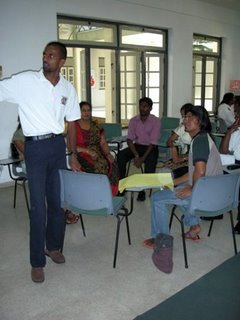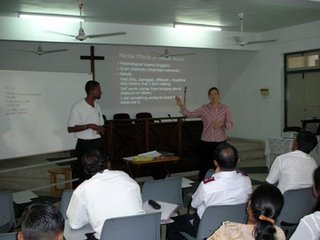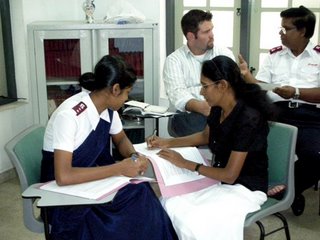
 programs, educational assistance, leadership training, moral development, cultural programs, awareness programs (parenting skills, HIV/AIDS, anti-human trafficking, health and nutrition), and livelihood training (English, computer, sewing, painting, service industry, masonry, & carpentry classes).
programs, educational assistance, leadership training, moral development, cultural programs, awareness programs (parenting skills, HIV/AIDS, anti-human trafficking, health and nutrition), and livelihood training (English, computer, sewing, painting, service industry, masonry, & carpentry classes).So! Mark - the CCD Coordinator - and I
have hired 3 "Outreach Officers" (for Galle, Hikkaduwa, & Kalutara), we have the Ampara Officer "in process," and after today's interview, may have (FINALLY) found a Child Development Program Director. An interesting problem we have faced in hiring qualified, experienced professionals who are committed to the communities -- is that those who are qualified were hired by big organizations (NGO's), paid 3-4 times what someone in their position would normally make, those big organizations have finished their "relief" work (now it's more about rehabilitation) and are leaving, but the local people quite enjoyed their MAMMOTH salaries (who wouldn't?), and
 now small church-based organizations like The Salvation Army can't afford to match those salaries. And so, we've found and lost a number of great personnel - due to the salary being a dealbreaker. We ARE learnering though... no more waiting until the person comes for the interview to discuss the salary. Now, we call to set up the interview, "Hi, we received your resume' and it looks good. What's your expected salary? Here's what we're working with... Still interested? Great. Come interview!"
now small church-based organizations like The Salvation Army can't afford to match those salaries. And so, we've found and lost a number of great personnel - due to the salary being a dealbreaker. We ARE learnering though... no more waiting until the person comes for the interview to discuss the salary. Now, we call to set up the interview, "Hi, we received your resume' and it looks good. What's your expected salary? Here's what we're working with... Still interested? Great. Come interview!"After months and months of details, delays, and (I won't lie) disappointments - the sports program is off the ground and running in Kalutara!! Oh my - and it was sooo much fun! Nothing has the power to chase away the frustrations of politics and pettiness like spending time with some kids who are PUMPED about getting to PLAY.
Of course, they all told me their names, and I practiced them over and over - and can only remember one. First picture, red-shirted girl on the left -- that's Ameesha. She was really cute and energetic and had absolutely ZERO tolerance when
 I forgot her name or mispronounced it (her method worked!). Names or not, I am praying for their little hearts and minds and bodies... that this sports program will be a great opportunity for all sorts of positive growth, to experience the love of Jesus, and to just be valued as a child.
I forgot her name or mispronounced it (her method worked!). Names or not, I am praying for their little hearts and minds and bodies... that this sports program will be a great opportunity for all sorts of positive growth, to experience the love of Jesus, and to just be valued as a child.








